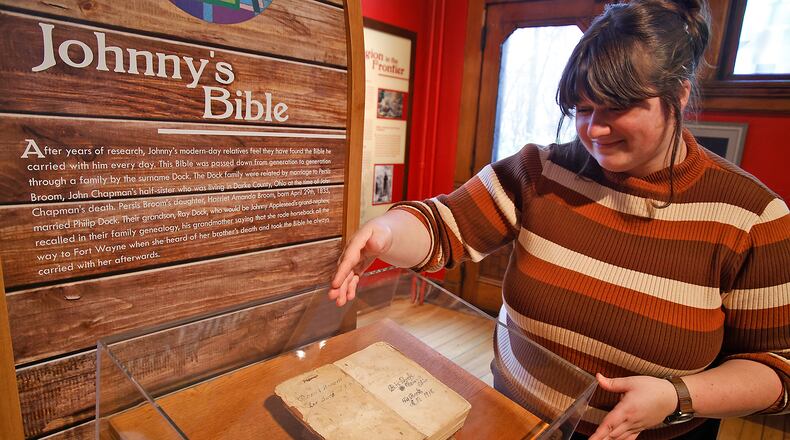The museum, located at 518 College Way in the former Browne Hall on the former Urbana University campus, will have a “soft opening” on Tuesday.
“We are all so excited that this has finally come to fruition after such a long process,” said Betsy Coffman, Johnny Appleseed Foundation president. “Those of us involved in this mission truly believe that the (museum) will continue to be a ‘gem’ for our community and region, as people learn about the history of this ‘real’ and remarkable pioneer folk hero who is part of our history and legacy.”
Coffman said they had hoped to open early this year or by spring, but the work took longer than expected. However, she said they felt “it was worth the wait.”
“We were working with ECI (Exhibit Concepts, Inc.) from Vandalia, an experienced professional organization, and the process of developing the exhibits and redesign was just more involved and took longer than we had anticipated,” she said. “We were dedicated to having a high quality re-design that incorporates the best of our previous exhibits along with new additions and interactive displays, which meant an extended time for completion.”
The museum closed three-and-a-half years ago in March 2020 when Franklin University closed Urbana University, a branch campus, because of the impact of the coronavirus pandemic. Franklin University sold the 143-year-old Browne Hall building, home of the museum and educational center since 2018, to the Johnny Appleseed Foundation in June 2020.
“We have spent the time since then raising funds for the purchase of the building to house the museum, re-inventorying the total collection, developing and implementing our redesign,” Coffman said.
Credit: Bill Lackey
Credit: Bill Lackey
The building houses a museum that preserves the history of the pioneering orchardist John Chapman, also known as Johnny Appleseed.
Chapman was an entrepreneur and a missionary, and his apple tree saplings and nurseries had a positive impact on settlers in Ohio, parts of Pennsylvania into Indiana as he pushed for further settlement. Cider produced from Chapman’s apples was also used as a reliable, sanitary drinking source, as water was often unsanitary at the time, foundation officials previously said.
Chapman also had personal ties to the area. He personally knew John James, of Urbana, a lawyer and banker who donated the land for Urbana College, later Urbana University, according to the foundation.
“Our museum and staff will strive to provide touring individuals and groups with an understanding of the cultural history of early 19th century America, Ohio’s pioneering history, and the life and travels of John Chapman within that setting — a true American Hero, whose character and virtues demonstrate our country’s most cherished values,” Coffman said.
A grand opening will be held in spring of 2024, close to Earth Day and Arbor Day.
The museum is free to the public. Operations are funded on individual donations and fundraising. If you want to bring a group of six or more, call the museum ahead of time to make arrangements with Museum Director Mikaela Prescott.
Museum hours will be from 10 a.m. to 4 p.m. Tuesday through Friday and from 10 a.m. to 2 p.m. on Saturdays.
For more information or to arrange a visit, call or text 937-206-0915, email director@johnnyappleseedmuseum.org or visit the museum of Facebook.
About the Author


